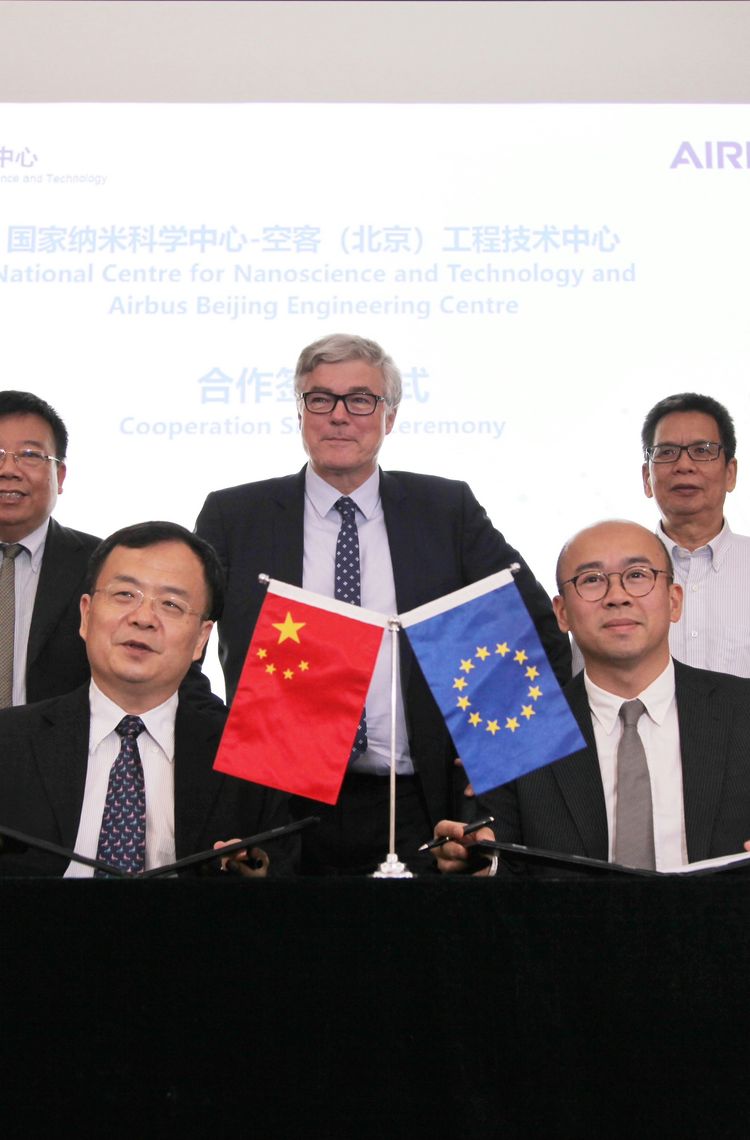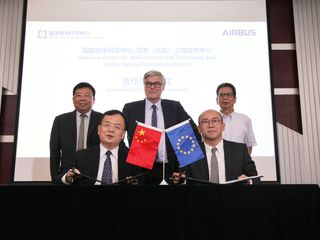A joint lab established to explore the application of nanoscience in aeronautic industry
Airbus Beijing Engineering Centre (ABEC), a joint venture between Airbus and China Aviation Industry Corporation (AVIC), opened a new lab on nanocomposite materials jointly with National Centre for Nanoscience and Technology of China. On the same day, the two parties signed a cooperation agreement on engineering polymer nanocomposites for aeronautic applications.
Both sides agree to carry out R&T activities on electrically conductive, self-healing and toughening nanocomposites. The aim is to explore the application of the state-of-art nanocomposite technology in the aeronautic industry.
The research will be jointly conducted by ABEC engineers and a group of top Chinese academies and universities, including NCNST, Tsinghua University, Sun Yat-Sen University, HK University of Science and Technology and Hong Kong Polytechnic University. The cooperation is also endorsed by Du Shanyi, member of the Chinese Academy of Engineering and Fan Shoushan, member of the Chinese Academy of Science, who will act as the project consultants.
Airbus also commits to set up an Airbus Scholarship programme in NCNST to support the development of the future talents in the nanoscience area.
Liu Minghua, Director of National Centre for Nanoscience and Technology of China said: “As the edge-cutting technology, nanoscience is changing people’s perception and will have great impact on the future economy and industry development. I am happy to witness today’s signature with Airbus and look forward to a fruitful result of our cooperation. And I would like to express my gratitude to Airbus for their support on the future talents nurturing by setting up an Airbus Scholarship in our centre.”
“I am delighted to witness another milestone in the history of ABEC and to see our cooperation in China extending to new areas with the new partners. Research and innovation are key drivers for Airbus and we think highly of China’s innovation abilities. China is a leader in the field of nanoscience, I am confident that we are able to contribute to the pragmatic application of nanoscience in the aeronautic industry, with the expertise of Airbus and our Chinese partners,” said Francois Mery, COO of Airbus China commercial aircraft.
Since its creation in 2005, ABEC has been successfully taking part in designing components for all the Airbus programmes including the company’s flagship A380 as well as A350 XWB. It performs the specific design work related to the 5% A350 XWB airframe work packages to be carried out in China.
Currently around 130 Chinese engineers work in ABEC, applying their skills and competencies in line with Airbus highest end standards and using state-of-art technologies. They develop engineering solutions along the full life cycle of an aircraft, which covers areas from research and design to manufacturing and in services support.
About NCNST
National Centre for Nanoscience and Technology of China (NCNST) was co-founded by the Chinese Academy of Sciences (CAS) and the Ministry of Education. It is a non-profit subsidiary of CAS, who enjoys full financial allocations as an independent non-profit legal entity. In NCNST, basic and applied researches in nanoscience have been positioned as the main research directions. The objective is to establish a public technological platform and research base for nanoscience, which is featured with state-of-the-art equipment and is open to both domestic and international users. Currently, NCNST has about 300 employees and more than 700 graduate students (including joint program students). The centre consists of three CAS key laboratories, which are Key Laboratory for Biomedical Effects of Nanomaterials and Nanosafety, Key Laboratory of Standardization and Measurement for Nanotechnology and Key Laboratory of Nanosystem and Hierarchical Fabrication.
Your media contacts
Contact us
Amelia Xu
AIRBUS | China

